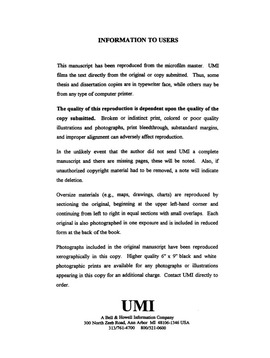| dc.contributor.advisor | Gross, David, | en_US |
| dc.contributor.author | Starck, Stephen Lee. | en_US |
| dc.date.accessioned | 2013-08-16T12:30:27Z | |
| dc.date.available | 2013-08-16T12:30:27Z | |
| dc.date.issued | 1999 | en_US |
| dc.identifier.uri | https://hdl.handle.net/11244/5772 | |
| dc.description.abstract | Miller attacks his world as fundamentally flawed. The world he critiques, however, still exists. The shape it was taking in the early part of the century has only become clearer with an urban crisis and mass lay-offs of industrial workers due to technological developments and the shifting of factories to third-world countries. Miller remains one of the great oppositional voices of "the American century." | en_US |
| dc.description.abstract | Henry Miller offers an "oppositional" critique of the West, rather than the Modernist "alternative" critique of an Eliot or a Joyce, openly attacking industrial capitalism for its inhumanity. French poets Charles Baudelaire and Arthur Rimbaud, precursors of Miller, voiced complaints similar to those Miller raised some sixty to eighty years later, and evinced much the same anti-bourgeois attitude. | en_US |
| dc.description.abstract | These critiques coalesce in Miller's denunciation of "Progress." People, though possessing a variety of commodities, are no happier. Rationality, furthermore, dominates lives, but in a dehumanizing fashion, most clearly evident in grid-cities and assembly-line work where laborers perform mind-numbing mechanical motions. Technology, rather than freeing, only further enslaves people. Miller, like Baudelaire and Rimbaud, denies progress in human affairs has occurred. | en_US |
| dc.description.abstract | Consumer capitalism, epitomized by the department store and sustained by factory labor, dominates. Thousands of new products and technological improvements mask discontent. People toil at jobs, receiving, in exchange, products which inspire only momentary satisfaction. Miller's critique of work and his refusal to support the Second World War are linked by his belief that the rich are the main beneficiaries of the system. The average American or European enjoys few of the alleged benefits of the industrial age. | en_US |
| dc.description.abstract | Miller condemns cities, especially New York City. American cities were often established quickly, to bring immediate profits to real estate investors, but little thought was devoted to their future inhabitants. These cities have little architectural history: older buildings have regularly been demolished to make room for new buildings. European cities, in contrast, present a historic text mixing old and new buildings, a space where businesses, cafes, parks, and dwellings mingle. | en_US |
| dc.format.extent | vii, 370 leaves ; | en_US |
| dc.subject | Sociology, Theory and Methods. | en_US |
| dc.subject | History, Modern. | en_US |
| dc.subject | Literature, American. | en_US |
| dc.subject | Miller, Henry, 1891-1980 | en_US |
| dc.subject | Literature, Modern. | en_US |
| dc.title | Hacking away with an ax: Henry Miller and modernity. | en_US |
| dc.type | Thesis | en_US |
| dc.thesis.degree | Ph.D. | en_US |
| dc.thesis.degreeDiscipline | Department of English | en_US |
| dc.note | Major Professor: David Gross. | en_US |
| dc.note | Source: Dissertation Abstracts International, Volume: 60-01, Section: A, page: 0133. | en_US |
| ou.identifier | (UMI)AAI9918759 | en_US |
| ou.group | College of Arts and Sciences::Department of English | |
